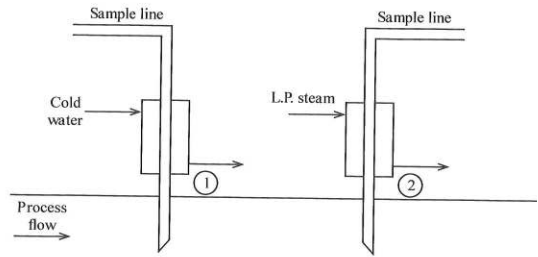Reference no: EM13256759
1. The figure below shows two sample points in a process line.

(a) What is the nature of the process fluid?
(b) What are the objectives of the two sample points and in what way do the samples reaching the instruments differ?
(c) Could the effectiveness of the second sample probe be improved and if so how?
(d) What additional feature would be necessary for the second sample line and why?
2. Before deciding on a pump to supply a sample, what information must be collected and why?
3. (a) For what purposes is it important to obtain a rapid response to changes in process stream composition and what methods are used, when designing a sample system, to achieve this?
(b) In the same situations as in (a) above, it is also essential to provide analyser systems which do not break down and which maintain their calibration.
What steps should be taken when designing the sampling system and the installation generally in order to ensure this?
4. (a) An X-ray fluorescence analyser requires a sample consisting of a thin layer of powder on a small conveyor belt. The material to be measured consists of a very large flow of solids of widely variable size and it is not certain that large and small pieces have the same composition. The material is also often damp, but the water content is of no interest. The material is transported on a large conveyor and finally dropped into a bunker off the end of the conveyor. Changes in composition are slow, so intermittent sampling can be used.
Explain, with diagrams as necessary, how you would supply a representative sample to the instrument.
(b) In the above example, how often would the sample have to be taken?
(c) If the objective was to determine the average value of the material in the bunker, how could this be done by making one measurement?
Attachment:- small_joel.rar